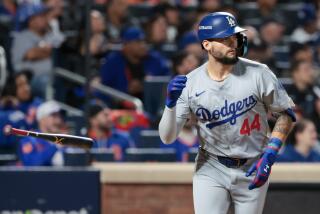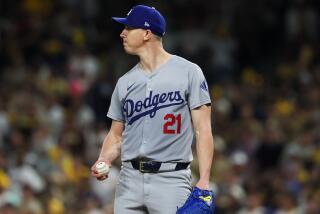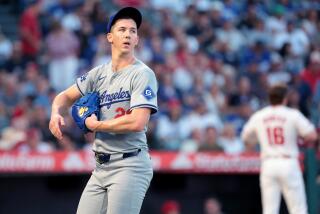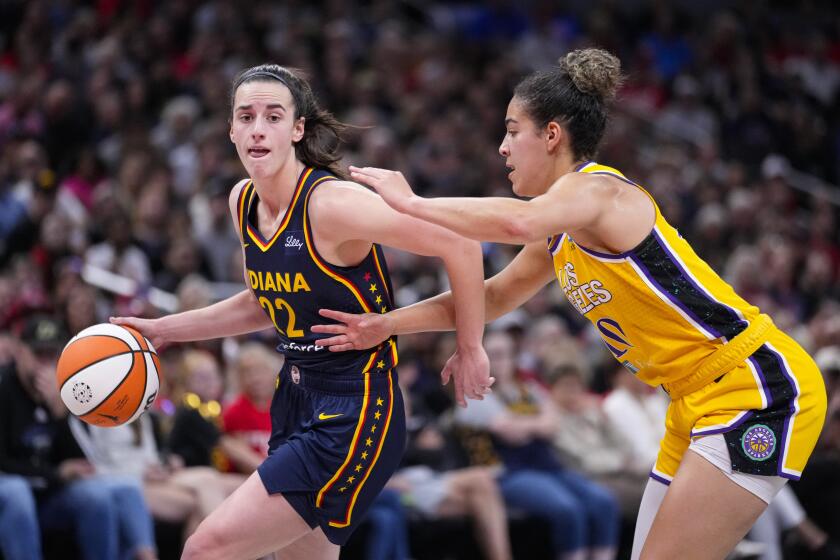No Hard Stuff Here, Just Pitches Smooth and Sweet as Honey
Baseball is a game that lives by its axioms.
It is a given in the grand old game that the American League is the laid-back circuit, the brother-in-law tournament where big, tobacco-chewing wild-swingers stand around waiting for three-run homers and big innings.
The National League is full of dog-eat-dog types who will scratch, pull hair, gouge or knee you in the abdomen to win. They will steal bases when they’re one run ahead, or one run behind, bunt for a hit, bunt for a run, give you no rest.
There are two different philosophies at work. Do you want to play John McGraw baseball--or Babe Ruth baseball?
The National is considered the pitchers’ league. By that is meant, you have to be a better pitcher to get by in the National League. They will figure so many other ways to beat you in the N.L., the wise money figures.
You make a fair pitch in the American League and you chalk up a K--or a pop-up. Those big wild-swingers are easy for a cagey pitcher. They hit only mistakes. It says here. The National League makes you bring it--go to your best pitch all the time.
Rick Honeycutt begs to disagree. Rick Honeycutt is the Dodger pitcher who has carved out a career by being one pitch ahead of the hitters. God didn’t give him a 100-m.p.h. fastball or a curveball that breaks 90 degrees and could go around two poles on its way to the plate.
If he were a golfer, he’d be hitting a 4-wood where Greg Norman had used an 8-iron, but the results might be similar. Rick is sneaky fast and his ball bends, but his stock in trade is to keep the hitter off balance.
Rick doesn’t try for shutouts, he turns the eighth and ninth innings over to fresh arms. He tries to deliver seven or eight quality innings and put the game in place for the win column.
He thinks that is easier to do in the National League for one big reason--the lack of a designated hitter.
To Honeycutt, the designated hitter translates to more than just one more bat in a lineup. It throws the whole choreography of pitching off line.
“You still have to make quality pitches, but in the National League, you work through hitters Nos. 3 through 7 and you have done your work,” he says.
“They don’t give up outs in the American League, by and large--the bunts and the hit to the right side to move the runner. They play the power game with you.
“Then, you get to the eighth and ninth hitters and in the American League you still have to come up with the fine-tuned pitches. In the National League, you never have to give in to the eighth-place hitter. You can try to make him hit a bad pitch. If you walk him, so what? The pitcher is coming up next.
“In the American League, Don Baylor may be coming up next. You tell me if you want to walk somebody in front of him. “
Honeycutt has quietly become one of the most dependable starters in the Dodger rotation. In fact, he leads the league in earned-run average with 1.71. He has thrown a shutout, has struck out 48 in 47 innings.
In fact, there have been times when Honeycutt qualified as the stopper on the staff. The stopper is the guy who grabs the club by the collar just as it’s about to disappear over a cliff and keeps it in the race.
Four years ago, when he came to the Dodgers, hardly anybody would have predicted this role for Honeycutt this far down the line. It was considered he would more likely be lolling in a pool somewhere, sipping tall drinks and cashing checks for doing nothing.
The Dodgers, like a lot of other National League teams, have had bad luck with American League imports. And it was widely considered around the league that the Dodgers had made another blunder in the marketplace when they gave up a pretty good fireballing starter, Dave Stewart, and a promising reliever, Ricky Wright, for another guy who couldn’t pitch in the National League.
There were the seemingly obligatory injuries. But when Honeycutt had his good pitches and could throw them without wincing, the Dodgers contended.
He’s solidly in the rotation now and, if the bullpen could take the wrapped and beribboned seven innings he turns over to them and smuggle them into the clubhouse, the Dodgers could again be in the heat of the race.
Whatever happens, Honeycutt believes he has proved that good pitches work in either league. And if you can beat a 10-man lineup, there’s no reason in the world why a nine-man one should be harder.
More to Read
Go beyond the scoreboard
Get the latest on L.A.'s teams in the daily Sports Report newsletter.
You may occasionally receive promotional content from the Los Angeles Times.










